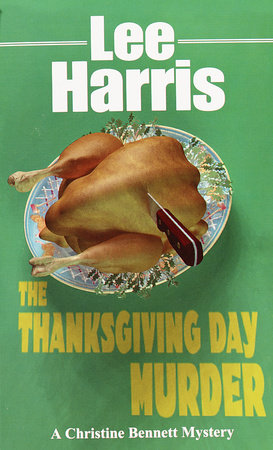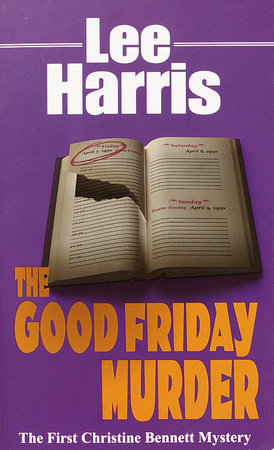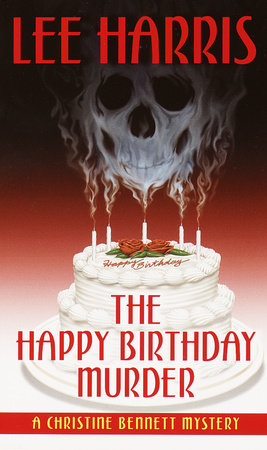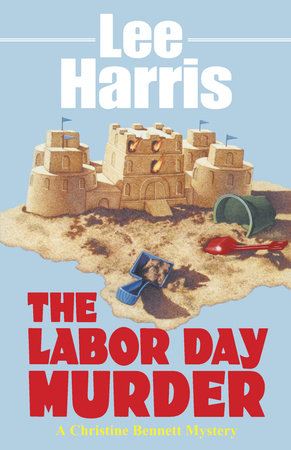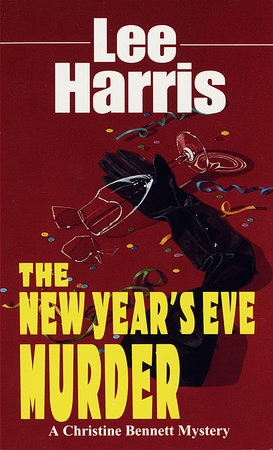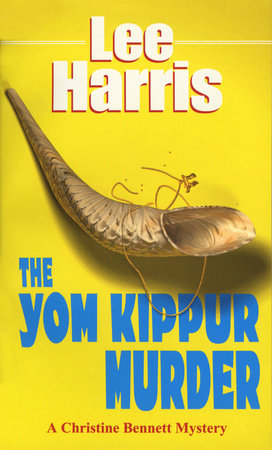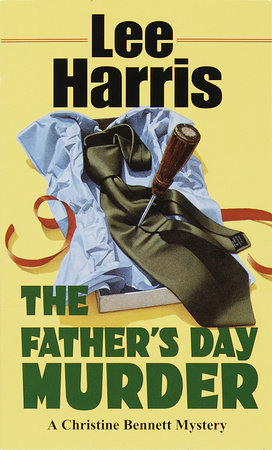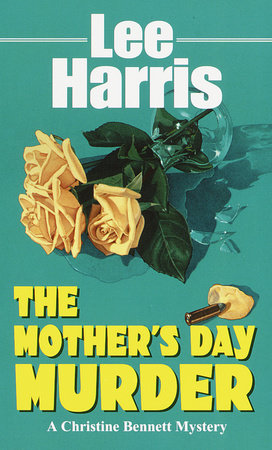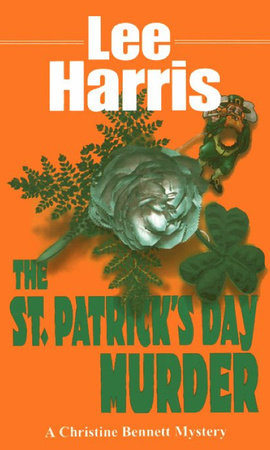Excerpt
The Thanksgiving Day Murder
1
I drove my cousin Gene back to the residence for retarded adults after mass that very cold Sunday morning. On many Sundays he joins us for dinner or the afternoon or I join him at Greenwillow while Jack studies, but on that Sunday Jack and I were invited to our friend and neighbor Melanie Gross’s house just down and across the street from us for a Sunday brunch. When I got home from Greenwillow, I changed my clothes. I am still old-fashioned enough to dress for church, but Mel had said to come casual and I put on a pair of wool pants and a white cotton blouse, taking along a sweater I probably wouldn’t need in Mel’s always warm house.
Jack, my husband of half a year, a detective sergeant in the NYPD by day and a law student by night, quickly took his “good” clothes off and got comfortable. At five to eleven, we locked the house and walked down the block.
“Who’s coming?” he asked as we neared the Grosses’ driveway.
“Mel said a mélange—friends, neighbors, even some relatives.”
“What’s the occasion?”
I laughed. “It’s Sunday and Mel likes to invite people and cook for them.”
“Oh, that kind of occasion.”
“There’s a New Jersey car. I think that’s the relatives.”
“Looks like snow.”
“Well, we don’t have a long ride home.”
“Let’s have a fire tonight. That firewood looks really great, good and hard and well seasoned.”
I slipped my arm around his waist, feeling the pleasure of marriage as once, in another way, I experienced the pleasure of living in a convent among wonderful women who are still my friends and will be forever.
The door opened as we reached it and Melanie wrapped her arms around me as though we hadn’t seen each other in years.
“Welcome! Good to see you. Jack, I hope you’re hungry.”
“When am I not hungry? Hi, Mel.”
Inside, several people, none of whom I knew, had already arrived and Mel took us around, introducing as we went. Her dining room table was set extravagantly and her family room was set up with the most beautiful buffet I had seen executed by a nonprofessional. (Jack’s sister is a caterer, so I’ve seen some professional ones.) Not for the first time, I stood shaking my head in awe.
“How do you do it, Mel?”
“You know me. I like to keep busy.”
“It looks fantastic,” Jack said.
“Well, I learned a thing or two from your sister at your wedding. I hope she doesn’t mind my picking her brain. She was very generous with her secrets, Jack.”
His sister is a very generous person. Before we were married, she often gave Jack samples and leftovers, and though we’re farther from her now, she always manages to have some tantalizing food wrapped up for us in foil at the end of a visit.
“Why don’t we sit down,” Mel said.
“Why don’t we have some food first,” Hal, her husband, suggested to laughter.
“Good idea. Come on, kids, you first and then upstairs with you.”
The two Gross children, both very young, had ear-to-ear smiles. With help from their parents and baby-sitter, they loaded enough food on their plates for twice their number at twice their size and then ran off. It was open season for adults.
Jack sat next to Hal, a lawyer who was strongly encouraging of Jack’s pursuit of a degree, and I sat on the other side of the table between Mel’s college roommate and maid of honor and her husband.
“Mel told me you’re an ex-nun,” Rachel said. “Do you mind talking about it?”
“Of course not.”
“You look too young to have been a nun for long.”
“I spent fifteen years in the convent. I went in at fifteen. There were family problems—I’d been orphaned—and St. Stephen’s was kind enough to take me, although that’s a lot younger than they accept novices.”
“Incredible. You spent fifteen years in a convent?”
“Except for one when I got my master’s. They were wonderful years.”
“I guess what I’m curious about is what you did, how you spent your time.”
“Most of it in a very ordinary way. After I finished my education, I taught at the college connected with the convent.”
“Just as if you were a lay teacher?”
“Exactly. Of course, I turned my salary, such as it was, over to the convent and they gave me back what I needed to live on. There are nuns in some convents who hold regular jobs outside the convent, working for the telephone company or some other company and earning a regular salary. They come home to the convent at night, and on payday the convent gives them their carfare for the week, enough money for lunches, and anything else they might need.”
“So the convent comes out ahead.”
I smiled at her. “So does the nun. She has all the advantages of being part of a religious community. She participates in morning and evening prayers, she’s able to join activities that take place on Saturdays, go to retreats. There are many wonderful benefits to being part of a convent.”
“You really loved it, didn’t you?” she said, sounding partly surprised and partly admiring.
“Very much.”
“And then you left.”
Tactfully, she didn’t ask why. “I felt I had given all I could to St. Stephen’s, that I had more to give and this was where I could do it.”
“You sound amazing.”
I laughed again. “I’m probably the least amazing person you’ve ever met. I teach a course in poetry at a college not too far from here and I do some work for a lawyer in New York who’s become a friend of mine. Right now I’m trying to build a good, strong marriage. I’m friends with the convent, I visit there; in fact, we spent Christmas with them.”
“Your husband, too?”
“Both of us, yes. But I stayed on for a few extra days.”
“Oh, Mel told me about that. There was a murder, wasn’t there?”
“Unfortunately. It was very sad.”
“You should talk to Mel’s uncle.”
“Oh?”
“There’s something very weird in his life.”
“I’m not much of an expert on weird things,” I said, hoping to avoid being drawn into a family problem. “Do you live around here?”
She switched easily to talking about her home and her family, and after a moment, her husband joined in on my other side. They had suggestions on landscaping that I took note of. One of the things Jack and I wanted to do was increase the greenery on our property. Eventually it was time for dessert and coffee, for moving to chairs and sofas in the family and living rooms, for talking to other people and enjoying their conversation.
The afternoon passed so quickly, I was surprised to find it was after three and the first guests were getting their coats. I looked around to see whether Jack was ready to leave. Weekends are mainly for studying now that he goes to law school at night, but he seemed happily engaged talking to Rachel and her husband.
“Mrs. Brooks?”
I turned to see a tall, good-looking man about fifty standing next to me with a drink in his hand. His dark hair was newly graying, his eyes soft and gray-green, warm and easy. He was wearing a sporty shirt that struck me as expensive, the kind of appraisal I don’t often make. “I’m Chris,” I said. “Christine Bennett Brooks. I don’t think we’ve met.”
“I’m Sandy Gordon, part of Melanie’s diverse, unmanageable family.”
“Are you the diverse part or the unmanageable?” I asked, amused at the characterization.
“Probably both. Can we talk?”
“Sure.”
He led the way to the dining room, where the table, still covered with most of the dishes of the feast, was empty of people. Sandy Gordon pulled out a chair for me at what had been the head of the table, and he sat along the side so we faced each other.
“Mel’s told me a lot about you.”
“We’ve been neighbors for a year and a half and friends for most of that time.”
“I was talking to your husband earlier. He sounds smarter than most of the cops I’ve met.”
It’s one of the things that makes me bristle. “Jack isn’t the only smart person in the police department. They have a tough job, and sometimes the best they can do is follow the rules and procedures and not act as smart as they really are.”
He raised his hands as though to ward off a blow. “Forgive me, I didn’t mean anything insulting. I like your husband. I admire anyone who goes back to school when he has a full-time job and the usual responsibilities of life. I need your help, Chris. You may not think it to look at me, but I am a desperate man with a problem that no one has been able to solve, and believe me, I have tried to solve it.”


